When PSG almost got relegated: how an awful 2007/08 nearly ended in ultimate disaster
Before the Qataris healed PSG's wounds, things were painful indeed for France's trophy-hoovering giant. A star-studded side survived by a whisker in 2007/08 – but on-field matters were only half of the battle
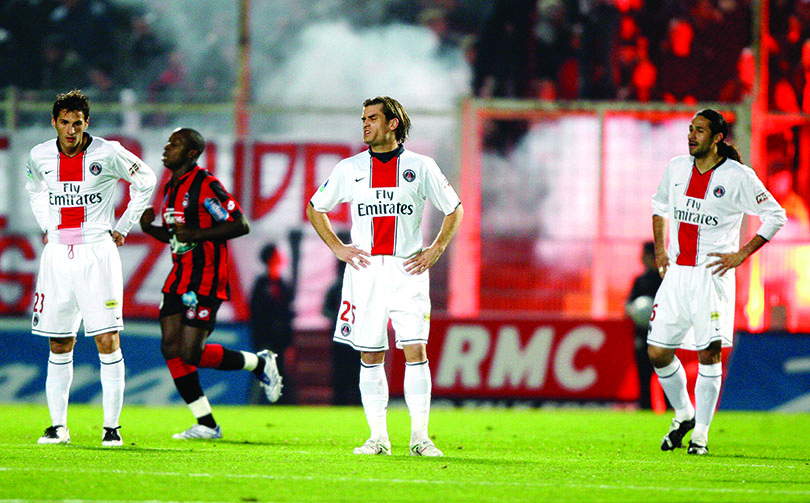
This PSG feature originally appeared in the May 2020 issue of FourFourTwo. Subscribe now and get every issue delivered to your door first!
The 800 Paris Saint-Germain fans who have travelled to Sochaux on this tense Saturday evening have stopped singing. It’s May 17, 2008, and France’s capital club –
Ligue 1 ever-presents since 1975, UEFA Cup Winners’ Cup victors in 1996, two-time champions up to this point – are playing their final game of the season. Sochaux have levelled the scoring thanks to a header from midfielder Guirane N’Daw. With 15 minutes to go, PSG are one goal away from relegation.
Paul Le Guen’s men had started the night in 16th place, but they’re 17th as things stand because relegation rivals Toulouse are beating Valenciennes. More than ever, the risk of seeing PSG sink into the second tier is very real. If Lens – currently 18th and drawing with Bordeaux – find a winner, the Parisians’ fate will be sealed.
The tension at the Stade Auguste-Bonal is desperate – palpable. A press box packed with journalists waits for the earthquake. Everything is in place for the great fall of PSG.
It has been a horrible campaign from start to finish, after all, and one final twist of fate would complete their misery. Throughout this entire campaign, the Paris outfit have lacked confidence, cohesion and self-belief. They have struggled for momentum and results, and won only nine matches.
But could this really be the day that witnesses PSG collapsing into the biggest crisis of their history?
Get FourFourTwo Newsletter
The best features, fun and footballing quizzes, straight to your inbox every week.
A disaster from day one
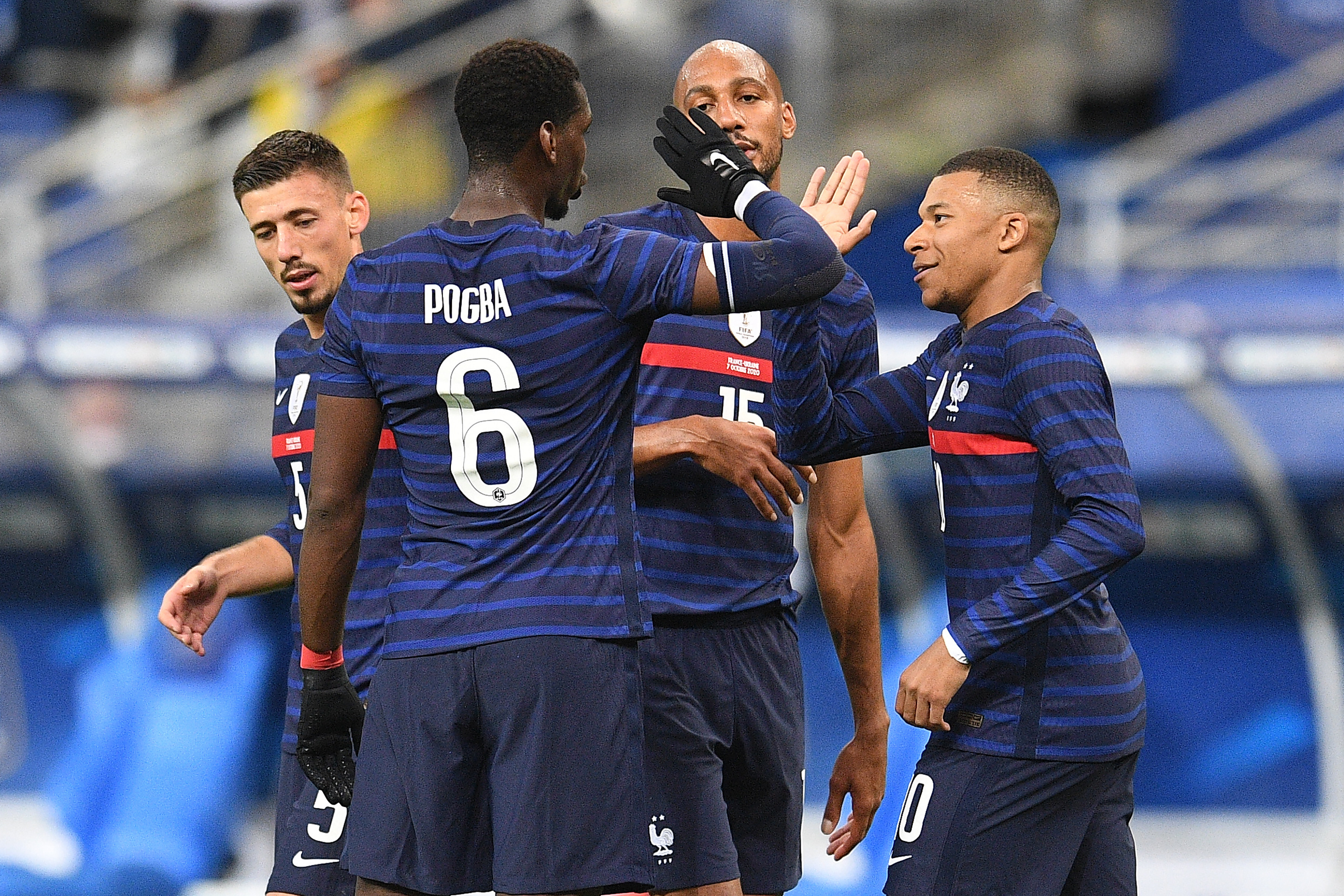
PREVIEW France Euro 2020 squad: Who will be in the 26-man squad?
In 2006/07, PSG had finished 15th in Ligue 1. By the end of March in that campaign, they were almost at rock bottom, sitting 19th in the table with nine games to go. However, an extraordinary final run of six wins – as many as they’d posted all season – and two draws with just one defeat ensured they stayed up that year with time to spare.
Looking up then towards dark clouds’ silver linings, it felt as if this was a good lesson for the French behemoths; one that could focus the minds of players, from youngsters such as Youssouf Mulumbu and David N’Gog to the well-established likes of Mickael Landreau, Mario Yepes, Jerome Rothen and Pauleta (whose 15 goals, including four penalties, had somehow made him the league’s leading scorer that season). Surely, from here, the only way was up.
So it was, then, that a wave of optimism took hold in the summer of 2007. Well-regarded centre-half Zoumana Camara and Marseille striker Peguy Luyindula had moved to Paris, after the January arrival of Argentina international Marcelo Gallardo, and president Alain Cayzac was feeling positive.
“I trust Paul Le Guen to find the solution that will make us win,” he tooted to media in pre-season, Le Guen having joined in January following a forgettable stint with Rangers. “We don’t forget that we endured a tough season last year, which left some scars. But we’re ambitious and I’m convinced that we’ll have a much better season, even if we don’t claim that we will win the league. I am confident.”
The owners also believed. PSG had been bought from TV network Canal+ by investment firms Colony Capital, Butler Capital Partners and Morgan Stanley for €41 million in 2006, and the new hierarchy were confident of creating something interesting at the Parc des Princes after slowly paying off the club’s debts.
They may not have admitted it publicly, but inside the club there was a genuine belief that PSG could be title contenders in 2007/08. Only two years ago, Le Guen had won the third of three consecutive league titles with Lyon. As a player, too, he’d been a respected PSG captain over seven years, winning seven major trophies in that time.
Yet, somehow, Le Guen and his players now managed to prolong PSG’s pain for another season – and this time, it was worse.
“On paper, this was a team full of internationals, such as Pauleta, Landreau, Luyindula and Yepes, as well as exciting youngsters like Mamadou Sakho and Clement Chantome,” recalls Rothen, one of the biggest names in that dressing room, as a France international.
“We had big goals and big ambitions. But our season never took off. Nothing went our way. We had no luck, and plenty of injuries, and we lost confidence. The negative spiral brought us down really quickly. It was almost like we had forgotten how to play football and win matches.”
The truth is that PSG’s 2007/08 season felt like a disaster ready to happen from day one. They didn’t record their first win of the season until matchday six, against Le Mans. After 12 fixtures, they had won only once and sat 16th in the table. By the end of November, PSG were in the bottom three, after another miserable defeat to Nice
in which teenage hopeful N’Gog scored what would prove his only league goal of the campaign.
It was a crisis, all right; a horrible nightmare for this giant of a club with designs on getting back into the Champions League. At that point, their annual budget of €70m was the third-biggest in France, behind Lyon (€145m) and Marseille (€97m). Simply, the whole thing was an absolute mess.
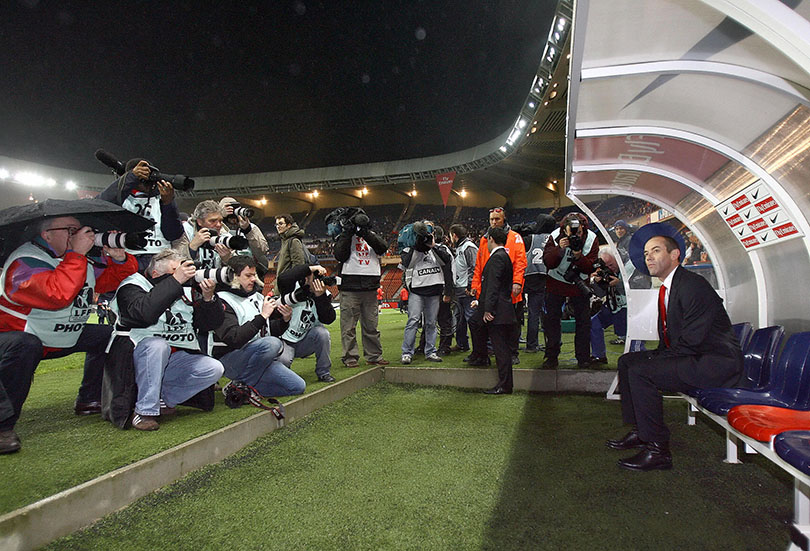
Banners, bans and broken bottles
Le Guen was failing to find the answers, and PSG spent five weeks
in the relegation zone as a result.
The former centre-back’s man-management was questioned, and a string of strange coaching decisions lost him some respect among the media. More importantly, Le Guen lacked the charisma required to remobilise his players. Instead, they just drifted. There was never a clash or a fracture, as such, between the manager and his players – that is, he never truly lost the dressing room – but most of them weren’t really keen on his presence, either. He struggled to get his messages across, and PSG never got going.
“Le Guen was never the right coach for the job,” remembers one player from that side, who wishes to remain anonymous. “He had a great squad, but he simply wasn’t good enough. It felt like he had a Porsche but was driving it more like a Fiat. I’m convinced that with a better manager, we would have been able to fight for a top-five finish. Instead, it was a long and painful season when pretty much nothing went our way .”
It’s very easy to blame Le Guen. He took over from Guy Lacombe halfway through the 2006/07 campaign, after a difficult 10 months spent in Scotland, and was tasked with keeping a floundering PSG above water. He did so. The Parisians were 17th when he arrived, and finished 15th. There was nothing revolutionary about what he did, but the new boss at least made a positive impact in steadying the ship and avoiding a catastrophic relegation.
But that positivity didn’t last too long. Despite their strong finish to that season, Le Guen looked adrift from then on, and didn’t respond well to the increasing pressure from media and fans. He was often targeted by PSG’s unforgiving ultras: on numerous occasions, they asked the club to sack him, or Le Guen to leave of his own accord.
As ever, though, the share of blame lay somewhere in between. Failures of such extent are rarely, if ever, the fault of a coach alone, and PSG’s hapless players had to shoulder a fair share of the burden. Despite the relative strengths of a squad stacked with experienced internationals, team spirit was never the greatest until it really had to be, and remained absent during long, sorry patches of poor form. Ultimately, the Parisians were blighted by the presence of various individuals who thought far more about themselves than the team and the football club.
Portuguese striking legend Pauleta was not one of those. He was, however, an ageing leader who signed off in 2007/08 with the worst goalscoring season (eight league goals) of his eight-year career in France, before retiring at the end of the campaign. And things were just as tough defensively for PSG: they kept only five clean sheets in the 19 Ligue 1 fixtures that followed a winter break in which they teetered just above the trapdoor.
The paradox is that while they laboured in Ligue 1, Le Guen’s PSG excelled in their other domestic competitions that season. This was clearly more of a cup team, more than capable of pulling off isolated excellence on their day but not for a sustained spell. They lifted the Coupe de la Ligue, beating fellow relegation-battlers Lens 2-1 in the final with a stoppage-time strike from Bernard Mendy, and they also reached the final of the Coupe de France, where they lost narrowly to Lyon in extra time.
However, even their League Cup triumph was marred by a banner unfurled by ultras insulting the Lens natives. It read: ‘Paedophiles, unemployed and inbred: welcome to the Ch’tis’ – ‘Ch’tis’ being the uncomplimentary nickname given to those hailing from that region in the north of France, and which featured in the title of 2008 hit film Bienvenue chez les Ch’tis, the country’s second-highest-grossing movie of all time.
It sparked a national outrage. One of the club’s ultras group, the Boulogne Boys – among the oldest hooligan firm in France – was disbanded in response, following an investigation. Lens mayor Guy Delcourt, presumably not unaware of the scoreline, demanded the match be replayed after the incident. It wasn’t, but PSG were fined and banned from the following season’s tournament before getting the sanction overturned on appeal.
Despite the victory of their appeal, the incident tarnished PSG’s image and portrayed their supporters in a negative way once again. It would not be the last time, either. The club has suffered several issues with its ultras over recent seasons – particularly the Kop of Boulogne, a racist and violent faction of PSG’s fanbase. In 2007, the death of one of its members, Julien Quemener, following a Europa League home defeat to Hapoel Tel Aviv, will forever remain one of the darkest pages in the club’s history.
PSG’s problems in 2007/08 were not limited to performances on the pitch. Their ultras, notorious for their violence, weren’t prepared to accept the team’s poor results.
The ultras started to show their discontent a few months into the season by protesting at the club’s training ground in Saint-Germain, turning up unexpectedly to put pressure on players by threatening them verbally, and sometimes even physically.
From December onwards, they boycotted the first 15 minutes of each home game, during which they refused to sing or support the team. Rien. But all that did was add to the strange and deleterious atmosphere at the Parc des Princes, now a toxic place of protest as much as a football stadium. And it got completely out of hand.
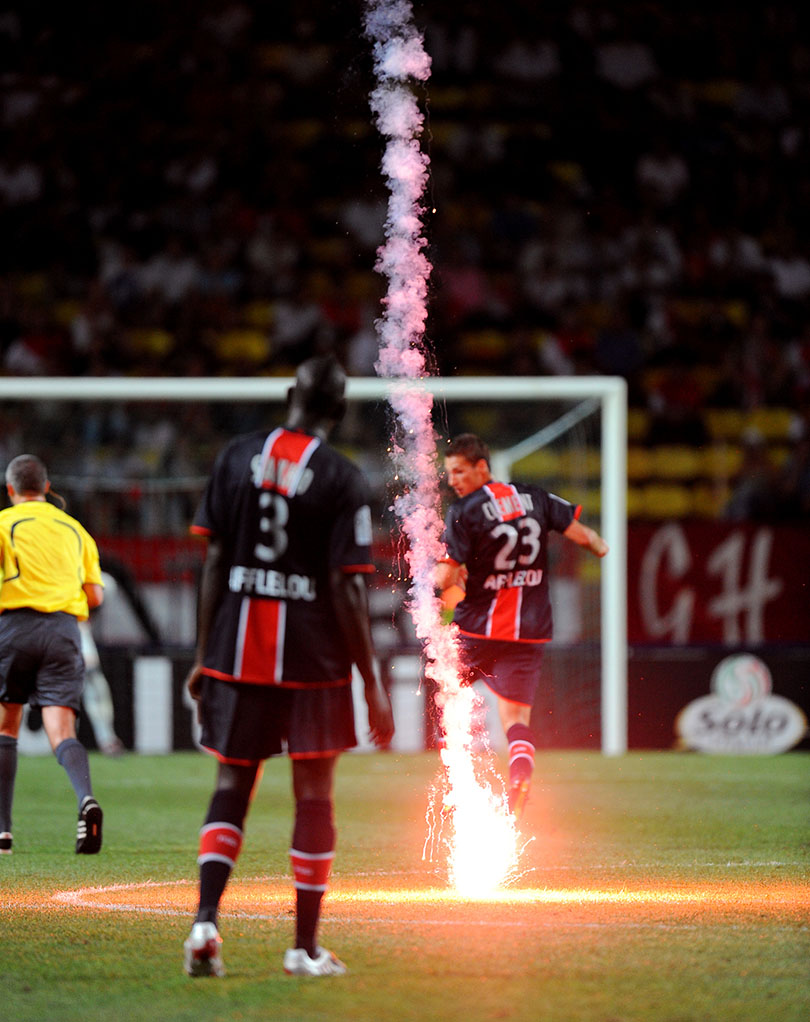
The tension rises
PSG’s 3-0 defeat at Caen in April – their third loss in a row – was the final straw for the ultras. A message was scrawled on a wall at the training ground: “You go down and we will gun you down.”
On the same day, Sylvain Armand’s sports car was destroyed, as thugs chucked a metal barrier on it and shattered the windscreen. They threw stones and bottles at other players’ vehicles, and also insulted anyone in sight. It was chaos.
“We felt all the players weren’t focused and committed enough,” Stephane, a Parisian ultra for the past 20 years, tells FFT. “It looked like they didn’t care – but for us, PSG is everything. It’s our life. We felt we had to save the club because it was going down the wrong path. The only thing we could do to get the players to wake up and raise their game was be aggressive and put them under pressure. The best way to do it was those visits to the training ground.”
Other banners were revealed. They featured slogans such as ‘Le Guen, get out’ and the poetic ‘You can all go f**k yourselves’.
“They didn’t want the club to go down, but the extra pressure they added didn’t help us,” says Rothen. “It created more tension for the players. The atmosphere was heavier. We should have been united; instead, even our own fans were against us. It was a nightmare.”
Rather than raising the players’ performances, the ultras’ actions had the opposite effect: they made PSG’s underperforming – and now intimidated – stars doubt themselves even more. Even Pauleta was a shadow of himself. In his final season as a professional, the club’s (then) all-time top scorer was struggling. He knew it was his last, but this 2007/08 campaign seemed like one too many. At 34, and turning 35, he looked tired and deflated. After the Caen fiasco and incidents that followed, the striker had strong words.
“I’m shocked,” Pauleta said. “But I’ve been shocked for a while.” Without their talisman at his best, the rest of the squad was lost.
Another absent soul was Alain Cayzac, the club president. While he loved PSG dearly, he was blinded by everything that was going on around him. Instead of setting the team on a strong course, Cayzac ran the club like a fan. He was too soft, too lenient, and the owners quickly lost patience with him. Although the local suit had almost been sacked the previous season, and again a few weeks earlier, he couldn’t survive the defeat at Caen.
Cayzac was replaced by one of his friends, Simon Tahar, who was also a PSG supporter, although he didn’t stick around for long. A new sporting director, Michel Moulin, was also hired. In a crisis situation, Moulin was an intriguing choice: a self-made man with a big mouth, he knew little about football – but ultimately, his job was to breathe life into his new club. And it worked, in a way.
Between that defeat at Caen on April 19 and their decisive game in Sochaux on May 17, PSG endured the most tense period in their history. The stakes were huge. With four games of the season left, Le Guen’s side were in the bottom three, and as many points from safety. But in the opening match of that mini-series, with memories of Caen lingering, they saw off Auxerre 3-1 at the Parc des Princes with a rare performance of pride and courage. They scored inside three minutes via Pauleta and doubled their advantage before the quarter-hour mark when Amara Diané drove hard and low beyond Daniel Niculae. Although Jean-Pascal Mignot halved the deficit with 12 minutes remaining, Diané made sure of the win.
PSG were very much still in the mire, however, and consecutive draws against Toulouse – having conceded an 87th-minute leveller – and Saint-Etienne were not enough to alleviate fears going into the final showdown. They were, at least, still alive, and with fate in their own hands. Everything would rest on the trip to Sochaux.
“We never thought it would come down to the very last day of the season,” remembers Stephane. “Some of the fans did think that it might be a good thing for the club to be relegated, so we could have a fresh start. Others were really angry at the players, and had the team gone down, they would have created hell – much worse than what happened after Caen. But I think, deep inside, we all wanted the team to be safe.
“We were allowed 800 away fans in Sochaux, but could have taken 4,000 or 5,000. In a horrendous season, we wanted a happy ending. I never thought it would be that bad; I thought we could finish in the top three. Instead, the bottom three was a possibility.”
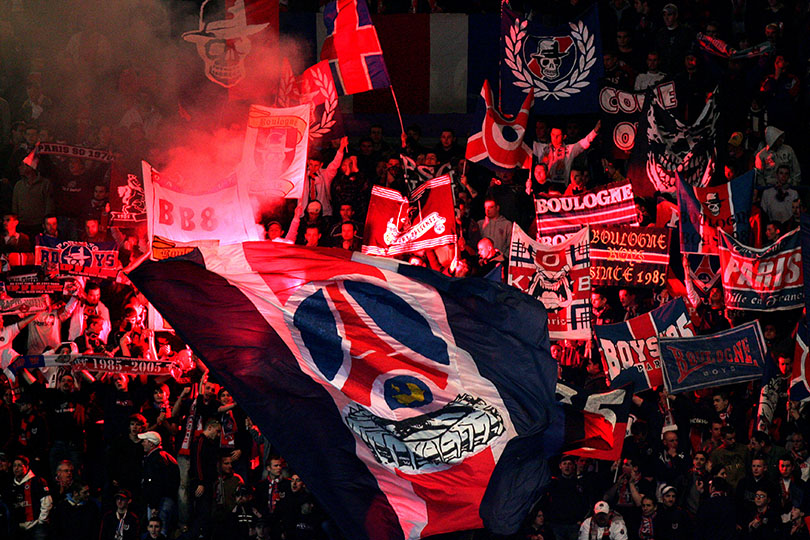
The road to Zlatan-mania
In a club’s history, you usually remember all the trophies; the cup finals; the great comebacks; the super goals; the huge derby wins. Sometimes, you remember that one game which saved your team.
“You can’t forget that last match at Sochaux to stay in Ligue 1,” Mamadou Sakho explains to FFT. The centre-back, made captain at the age of 17 that year by Le Guen, is still emotional about it now.
“We played the game of our lives that day,” continues Sakho. “The pressure was intense, but funnily enough, I didn’t feel much anxiety before the start of the match. I can still recall the full-time whistle, though. It felt like we’d just won a title. People were in tears.
“You grow as a club and as a player in those moments. We were aware of the big responsibility we had on us to make sure that we stayed up... and we did.”
On that night in Sochaux, Diané’s second goal in the 83rd minute handed PSG a 2-1 victory and, vitally, a place in the top flight for the following season. The 800 fans in the away section went ballistic, as 10 months of tension, resentment and disappointment finally came to an end. Relief was mixed with joy, and the anger of a few weeks previous had evaporated.
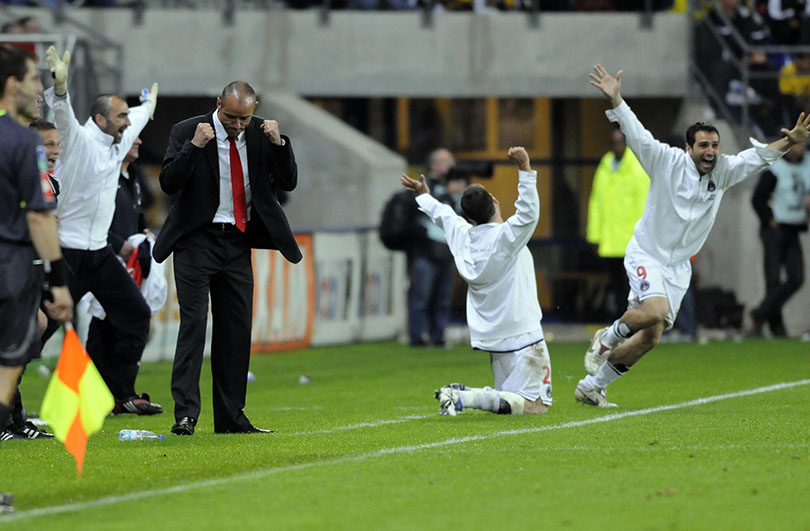
Diané, who’d also bagged a brace in that key victory over Auxerre, had been the saviour once again; the hero of a dramatic last game. Pauleta, the captain who had just played his 211th and final game for the club, was crying. Under his shirt, he had readied a thank you message to fans. His scoring record stayed on 110 goals (and was eventually beaten, first by Zlatan Ibrahimovic and then by Edinson Cavani in 2018), but he couldn’t have cared less. What happened in Sochaux was bigger than any individual performance.
Le Guen had kept PSG up for a second campaign running, but that wasn’t supposed to be in his job description. He stayed for another season, and a resurgence that led to them finishing 6th in 2008/09, missing out on a return to Europe only on goal difference, proved he was capable of performing better. But his coaching career nosedived thereafter. He didn’t fare well with Cameroon, losing all three games at the 2010 World Cup, nor with Oman. He then failed in Turkey at Bursaspor, where he didn’t even last a full season, and is currently in charge of Le Havre in France’s second division.
But Le Guen was merely one part of a bigger picture. The night of May 17, 2008 changed PSG’s history. Had they suffered relegation to Ligue 2, France’s future juggernaut might not have been bought by Qatar’s royal family three years later. Without survival in 2008, they probably wouldn’t have gone on to dominate French football in the way they have done since 2011. And without Diané’s double, we certainly wouldn’t have seen Zlatan, Neymar, Kylian Mbappe or David Beckham at the Parc des Princes.
In the end, PSG really were too good to go down – but only just.
Subscribe to FourFourTwo today and get your first five issues for just £5 for a limited time only - all the features, exclusive interviews, long reads and quizzes - for a cheaper price!
NOW READ
QUIZ Can you name Manchester City's top 50 most expensive signings?
